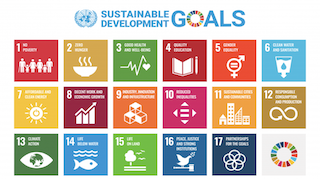In September 2015, every UN member country endorsed the 2030 Agenda for Sustainable Development, which comprises 17 target areas known as the Sustainable Development Goals (SDGs).
 After falling from 10.1 percent in 2015 to 8.6 percent in 2018, the global poverty rate increased to 9.2 percent in 2020 because of the COVID-19 pandemic, reversing a long trend of poverty reduction. Other headwinds such as armed conflicts, rising inflation, food insecurity, and political and social unrest also are affecting global development, and the UN estimates that these crises combined to cause an additional 95 million people to live in extreme poverty in 2022.
After falling from 10.1 percent in 2015 to 8.6 percent in 2018, the global poverty rate increased to 9.2 percent in 2020 because of the COVID-19 pandemic, reversing a long trend of poverty reduction. Other headwinds such as armed conflicts, rising inflation, food insecurity, and political and social unrest also are affecting global development, and the UN estimates that these crises combined to cause an additional 95 million people to live in extreme poverty in 2022.
On the other hand, the digital revolution has made many people’s lives easier with access to mobile phones, the internet and other tools. Digital financial inclusion (DFI) and its innovative business models have had a particularly disruptive effect, bolstering financial inclusion worldwide.
Impact on Sustainable Development Goals
DFI is enabling all types of pathways to advance the achievement of the SDGs, strengthening the link between financial inclusion and development. In 2016, CGAP and the UN Secretary General’s Special Advocate (UNSGSA) for Inclusive Finance for Development determined that DFI furthered progress toward 11 SDGs. In 2018, UNSGSA published new research showing that a total of 13 goals were positively influenced. In 2023, the research was updated again, with more evidence showing encouraging signs of progress.
Regarding SDG 1, “End poverty in all its forms everywhere,” DFI has helped the most vulnerable populations to channel cash flows and build resilience when facing tough situations. Both social protection transfers and remittances received through mobile devices have helped stabilize income streams. Outstanding examples include: Kenya, where the use of mobile money lifted 1 million households (2 percent of the population) out of extreme poverty from 2008 to 2014; Brazil, where the COVID-19 Emergency Program supported microentrepreneurs, informal workers and unemployed citizens by setting up digital savings accounts that reached more than 68 million participants, including 5 million microenterprises; and Colombia, where the Ingreso Solidario program provided financial support via bank accounts and mobile wallets to 4 million low-income households to help them cope with the COVID-19 crisis.
For SDG 2, “End hunger, achieve food security and improved nutrition and promote sustainable agriculture,” DFI has improved the efficiency of agricultural value chains and offered new opportunities to smallholder farmers to use financial products to bolster resilience to shocks. Noteworthy examples include: East Africa, where farmers who accessed agricultural microinsurance through mobile devices between 2009 and 2012 earned 16 percent more than their uninsured peers; Uganda, where the use of mobile money accounts increased food security in rural households by 45 percent; and Lebanon, where digital transfers to 87,000 Syrian refugees via payment cards increased food and water expenditures by USD 25 per month in comparison to non-recipients.
For SDG 3, “Ensure healthy lives and promote well-being for all at all ages,” DFI makes families less vulnerable to major healthcare expenditures by improving the reach, effectiveness and management of health services, including the efficiency of wage payments to healthcare workers. Remarkable cases include: Pakistan, where mobile money-enabled incentives increased the efficiency of a tuberculosis program by mobilizing a wider population of screeners and improving availability of data, resulting in a 90-percent increase in patient treatment adherence and a 300-percent increase in detection over one year; Kenya, where M?TIBA, a healthcare financing platform, onboarded 4.7 million users and over 3,000 healthcare providers between 2016 and 2021, enabling the efficient management of more than 1 million treatment claims each year; and Tanzania, where Jammi, a mobile health microinsurance product, reduced insurance administration costs by 95 percent while enabling access to low-cost insurance via USSD, starting at USD 1 per month.
Given that researchers also have found ample evidence that DFI has helped with progress toward 10 other SDGs, it’s fair to claim that DFI drives inclusive growth and advances global development.
 India’s UPI
India’s UPI
Another impressive example of the DFI-development link is India, where the local instant payment system (Unified Payments Interface or UPI) has revolutionized commerce. The model builds on Aadhaar, considered the world’s largest biometric ID system. (As of 2021, 1.3 billion adults – 99 percent of India’s population – held Aadhaar cards.) UPI relies on a QR code massively used by people and merchants, offering services from hundreds of banks and dozens of mobile payment apps. The scan-to-pay system makes financial transactions convenient and low in cost. (No transaction fees are charged.) In 2023, the system reached the milestone of carrying out 8 billion transactions worth USD 200 billion for 300 million individuals and 50 million merchants. In 2022, the number of digital transactions in India exceeded the combined number in four big economies: the US, the UK, Germany and France.
Developing high-level, innovative skills
Bearing in mind the importance of the SDGs, Frankfurt School aims to support financial market participants – both practitioners and policymakers – in addressing current challenges and thriving through new opportunities facilitated by digital and inclusive finance by way of its Summer Academy and the upcoming online courses, Certified Expert in Financial Inclusion Policy and Certified Expert in Digital Finance.
This feature was written by Ricardo Estrada, an expert in inclusive and digital finance; its publication in the MicroCapital Monitor is sponsored by Frankfurt School of Finance and Management.
Similar Posts:
- SPECIAL REPORT: Leveraging Financial Inclusion to Get Food Security Back on the Increase #EMW2023
- SPECIAL REPORT: Small Is Beautiful – Sustainable Agriculture Finance
- MICROFINANCE PAPER WRAP-UP: “Driving Digital Financial Services in Africa Through Merchant Acceptance of Digital Payments,” published by Alliance for Financial Inclusion (AFI)
- MICROFINANCE EVENT: ICT4D Conference; March 19-20, 2024; Accra, Ghana
- SPECIAL REPORT: Inclusivity in Capital Markets Demands Sustainability Reporting
